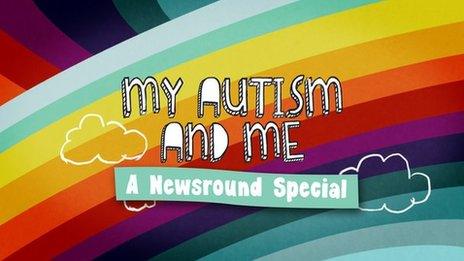Charity calls for autism training to become mandatory
- Published
- comments

A survey of teachers at schools in England found that the majority have had less than a day of training in autism.
Being autistic can affect how you communicate and interact with the world around you and that includes in school.
The National Autistic Society, which is the charity behind the survey, says it highlights how "autistic children and young people are being failed" and is calling for training to become mandatory, which means that all teachers would have to have the training.
The Department for Education says it recognises more needs to be done to support children with special educational needs and that it is investing £10.1 billion worth of support by 2023-24, which is 50% more than four years ago.
Autism spectrum disorder (ASD) - its medical name - is the name for a range of conditions which affect how a person communicates and interacts with the world around them, as well as their interests and behaviour.
Autistic people who are born with it and have it all of their lives. Some people prefer to call it 'autism spectrum condition' (ASC) instead of ASD.

What did the study find?
What did the study find?
The survey found that only 39% of primary teachers have had more than half a day of autism training and that fell to 14% for secondary school teachers.
However, 87% of teachers said they feel confident supporting autistic pupils.
Autistic pupils were also spoken to as part of the research and 70% of those pupils felt teachers do not understand enough about autism.
Tim Nicholls, from the National Autistic society, said: "Every child should be able to get the education they need but as this report reveals, many autistic students are being failed and denied the most basic support, or adjustments at school.
"It's equally important that all teachers and school staff receive mandatory autism training to improve understanding of autism in all schools. Without appropriate teacher training, autistic children are twice as likely to be excluded from school", he added.

The charity says teachers need more training so that they can support autistic pupils more effectively
What have others said about the survey?
The School leaders' union NAHT said teachers need to be able to access training and support but schools also need external advice and specialist support.
Paul Whiteman, who is the general secretary for the union, says too many schools leaders tell the union they find it "incredibly hard to access that support when they need it".
A Department for Education spokesperson said: "We recognise more needs to be done to support children with SEND which is why we are putting significant investment into the high needs budget.
"Within our recently published SEND and AP improvement plan, we set out our vision to improve mainstream education through setting standards for early and accurate identification of need, and timely access to support to meet those needs.
"We're also separately developing practice guides to support frontline workers, which will include a practice guide specifically on autism."
- Published1 April 2021

- Published11 November 2011

- Published17 November 2022

